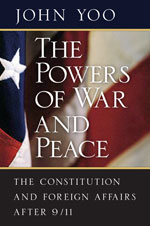 Law Professor Cass Sunstein offers this very interesting review of former Justice Department official and current law professor John Yoo's book, The Powers of War and Peace: The Constitution and Foreign Affairs After 9/11. Professor Yoo has been credited for arguing, while in the Justice Department, that the government has the legal authority to engage in domestic spying without judicial approval.
Law Professor Cass Sunstein offers this very interesting review of former Justice Department official and current law professor John Yoo's book, The Powers of War and Peace: The Constitution and Foreign Affairs After 9/11. Professor Yoo has been credited for arguing, while in the Justice Department, that the government has the legal authority to engage in domestic spying without judicial approval.Professor Sunstein begins his article by noting:
After the attacks of September 11, constitutional law was bound to change. Serious threats to national security have always had large effects on the nation's understanding of its founding document. A major reason is that the president's lawyers tend to see the Constitution as a highly flexible instrument, permitting their client to do what he thinks must be done. Francis Biddle, attorney general under Franklin Delano Roosevelt, said that "the Constitution has never greatly bothered any wartime president." Courts often ratify the decisions of wartime presidents. Roosevelt himself placed Japanese-Americans on the West Coast in internment camps, and the Supreme Court upheld his decision.
DNSI
0 Comments:
Post a Comment<< Home